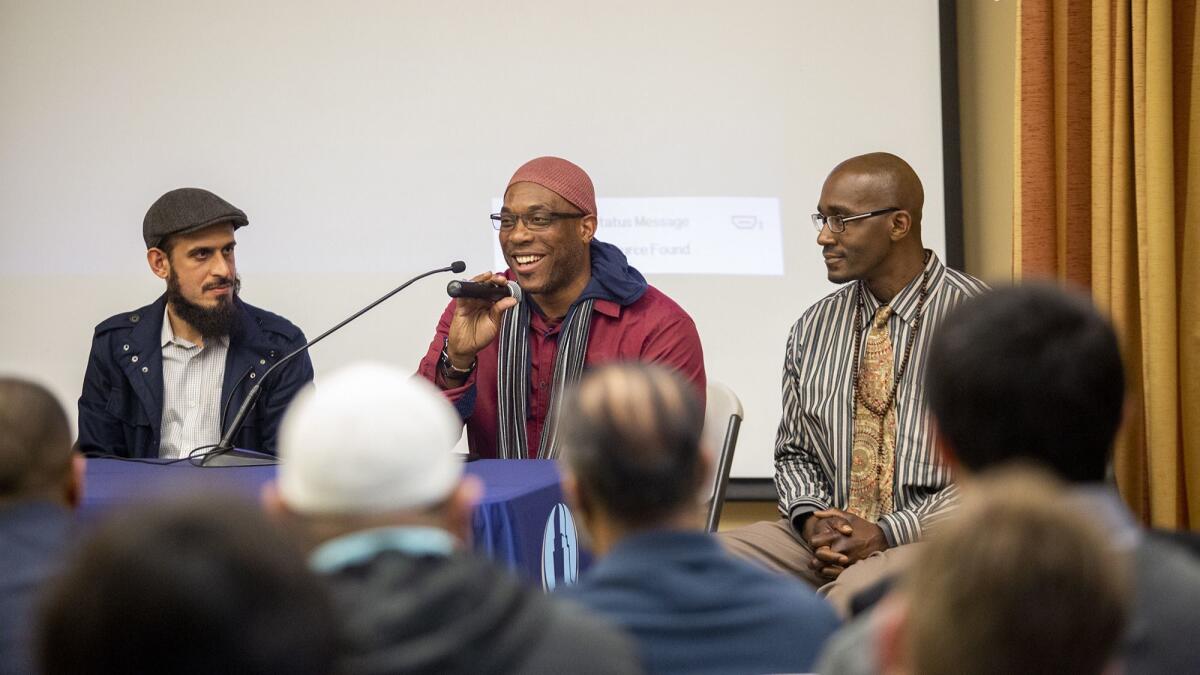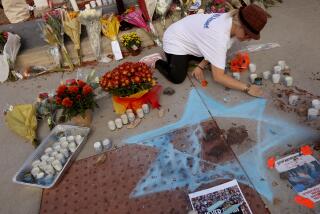Inspired in part by the teachings of Malcolm X, Orange County Muslims travel to distant prisons to minister to inmates

When Tobias Tubbs was incarcerated in a state prison in Lancaster, he immersed himself in books to learn more about his religion, Islam.
But it wasn’t until a group of Muslim volunteers from Orange County — more than 100 miles away — started visiting him that Tubbs truly reconnected with his faith.
Having a religious community, he said, brought the words he read in ancient texts to life.
“They brought connection,” said Tubbs, who spent 26 years behind bars for murder before then-Gov. Jerry Brown commuted his two life sentences to 25 years to life in October last year. “We’re all so isolated at faraway places that it’s difficult for our families and our parents to come. When you don’t have that kind of human connection, it tears at the human soul and personality of the individual.”
“We wanted someone to hear us out, to recognize our humanity and spirituality.”
The volunteers were part of Link Outside, a program affiliated with the Islamic Institute of Orange County in Anaheim that for the past eight years has offered a variety of services to Muslim inmates throughout California — and the nation — including letter writing, prison and jail visits, correspondence and in-person, college-level theology courses, as well as reentry assistance such as housing and obtaining official documents.
This year, the group started taking volunteers to Orange County jails and prisons.
The idea is that connecting Muslim inmates to their broader religious community gives them the support and resources necessary to succeed behind bars — and back in society.
“We’re one of the few A-to-Z programs, meaning we have services that we offer from the time they get arrested and are in prison to when they get released,” said Amin Eshaiker, program manager for Link Outside. “But really, the biggest need, from my experience, is that they want to feel accepted, they want to feel part of a community.”
This need is particularly great, Eshaiker said, since many Muslim inmates convert in prison, and may have never met a Muslim before or stepped inside a mosque. Even though Islam is thought to be one of the fastest-growing religions in prison, many don’t have access to Muslim chaplains or other religious resources while incarcerated.
“Even if that’s all you offer, by responding to them or visiting them once in a while, that’s more important than having a library full of books, or a course, so that they don’t feel alone in this, and that there are people out there who support them,” Eshaiker said. “That’s part of the motivation, once they get released, to stay on the right path, to not get distracted and to not go back to their old ways. It’s a form of rehabilitation.”
We’re one of the few A-to-Z programs, meaning we have services that we offer from the time they get arrested and are in prison to when they get released
— Amin Eshaiker, program manager for Link Outside
Prison ministry is not new to the American Muslim community. Perhaps the most famous American Muslim, Malcolm X, joined the Nation of Islam in prison and exchanged letters with the group’s leader, Elijah Muhammad, for years while he was behind bars.
Link Outside also grew from a letter-writing program. Eshaiker said the mosque would get several letters a day from Muslim inmates around the country, many of them explaining that they had been writing to different mosques for several years but never got a response. So Eshaiker decided to not only reply to each writer, but to digitize and archive each letter so that other volunteers could jump in and correspond when needed.
“I read Malcolm X’s autobiography, and I thought, ‘This is so similar to what we do,’” said Eshaiker. “He was getting these letters in the mail, and he had all these people to write to. It opened up his heart and his trust. It’s the same thing today.”
In conjunction with the mosque’s college, Cal Islamic University — which offers a bachelor’s degree in Islamic Studies — Link Outside developed correspondence courses in topics such as Islamic theology and spirituality, and eventually, in-person classes as part of a statewide program in which course hours take time off a person’s sentence.
Jesse Maroney, an instructor and program coordinator for Link Outside, said the lessons aren’t just academic, but also give inmates spiritual tools for healing such as meditation and a set of traditional Islamic spiritual practices known as purification of the heart.
“Guys are able to utilize the Islamic teachings to deal with some of their personal issues at a higher level, such as post-traumatic stress,” said Maroney, who was incarcerated for about 10 years. “Some of the spiritual practices help them deal with some of their emotions or with some of the traumas they have from their childhood.”
Gernay Quinnie Jr. attended Maroney’s classes for a year and a half during his 19-year sentence. After he was released in 2017, he said Link Outside helped him find housing and gave him the support he needed to get through college. He graduated from Associated Technical College in Los Angeles and now works in telecommunications.
“It gave me an extended family,” he said. “There are times when I’m down, there are times when I feel like giving up, but that family is the linchpin for succeeding out here.”
Quinnie said it’s not just inmates who benefit from the program. The volunteers are also changed once they see the humanity of their fellow Muslims behind bars, he said.
“When brothers begin to share their stories, it immediately dispels the criminal, non-criminal barrier,” he said. “They think, ‘that could have been me.’ And that’s where the healing is. There is maybe only a degree of separation between us and the visitor.”
Caitlin Yoshiko Kandil is a contributor to TimesOC.
More to Read
Get the Latinx Files newsletter
Stories that capture the multitudes within the American Latinx community.
You may occasionally receive promotional content from the Los Angeles Times.






